Hi, I have some troubles with the following expression in expression evaluator.
@FindString(@Value(_IDENT),R) ? @PadRight((@int(@TrimRight(@Value(_IDENT), TR,L]))+18),3,)L]) : @PadRight((@int(@TrimRight(@Value(_IDENT),NR, L]))+18),3,)R])
I test if an attribute contains the letter R,
if yes, remove letters L|R, add 18, then add the letter L to the end
else , remove all letters L|R, add 18, then add the letter R to the end
Problem is, all i get is the calucated value and no final alpha character.
What is wrong with my syntax?
Thanks.
Hi,
The ExpressionEvaluator is designed for evaluating a math expression, it may not work for string operations.
Consider using the AttributeCreator with Conditional Value setting.
Note:
@FindString function returns -1, if the target string doesn't contain specified string. If you intend to determine whether the string contains "R", the test clause should be:
0 <= @FindString(@Value(_IDENT),R)
And it's not necessary to quote arguments by e].
@TrimRight(@Value(_IDENT),RL)
@PadRight(
<a string>,3,L)
String Functions (
http://docs.safe.com/fme/html/FME_Transformers/FME_Transformers.htm#transformer_parameters/StringFunctions.htm)
Takashi
Hi,
Personally I'm of the view that the "simplest" solution is usually the best. While it can probably all be done with a single very-complex expression, doing this makes it less maintainable. When you (or a colleague) next come to it you'll have to decipher what's going on within it.
Instead, I'd do it with transformers. A combination of the following should do it:
- Tester
- AttributeTrimmer
- StringConcatenator
- StringFormatter
Cheers,
Jonathan
It also functions as bolean Takashi, try it out.
Bu the expression is incorrect. The @int needs a float as input, and is illogically used. Remove it.
Also the 3 suggest you only want 3 characters returned??? This should be ofcourse Original stringlength +1.
This works in the Expressionevaluator.:
@Evaluate(@Evaluate(@FindString(@Value(tst),R,0,T))?"@PadRight(@TrimRight(@Value(tst),eR,L])+18,@StringLength(@TrimRight(@Value(tst),eR,L])+18)+1,L)":"@PadRight(@TrimRight(@Value(tst),eR,L])+18,@StringLength(@TrimRight(@Value(tst),eR,L])+18)+1,R)")
The @Evaluate is mandatory to ..well have it evaluate
this results in:

..should be Original stringlengt + 2 (for the number "18") +1 wich is same as
Hi Gio,
As an example value, 18R , I need to first add 18 to this, so i must remove letters, then perform the math 18+18=36, then apply the letter L. My final results needs to be 36R from original 18R. The result I get from your expression is "17+18L" .
My explanation probably wasn't clear about that.
I agree with Jonathan. It's better to use existing transformers to make the workspace have higher understandability and maintainability, unless there is a special reason or the purpose is to learn more about FME functions.
If there were a reason for doing that within one transformer, I would use an AttributeCreator with Conditional Value setting, like this.
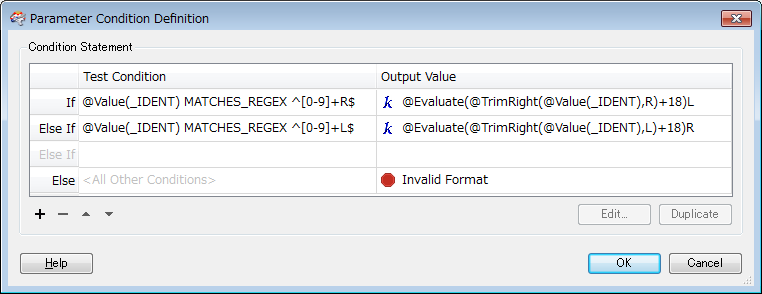
Based on the transformers suggested, I made it work. Although I did use a lot of transformers to do it.
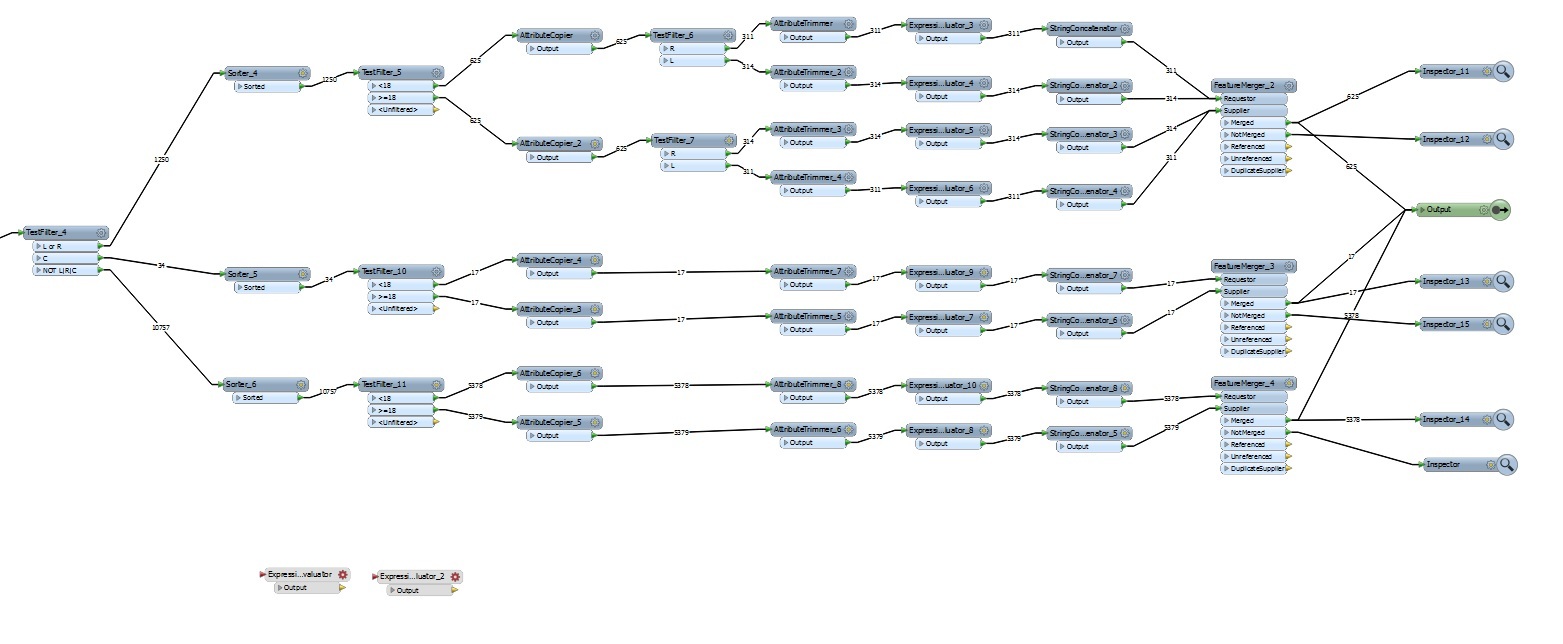
Thanks Takashi for your help. Your answer was most helpful. Just a small modification
@Evaluate(@int(@TrimRight(@Value(_IDENT),R))+18)L
I have to include @int because occasionally the _IDENT has a value 08 for example, the zero infront causes errors.
I guess for the amount of time spent figuring this out, I did the alternative method in a fraction of the time. But its nice to have a single transformer solution.
Possibly these 3 transformers do that.
Modify appropriately the math expresion and the replacement character for 'C' according to your actual requirement.
StringSearcher
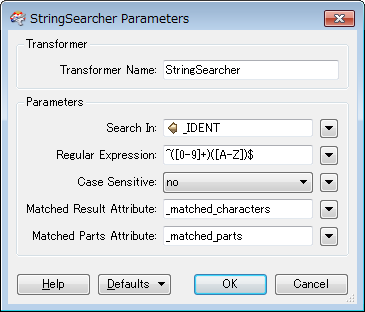
AttributeCreator
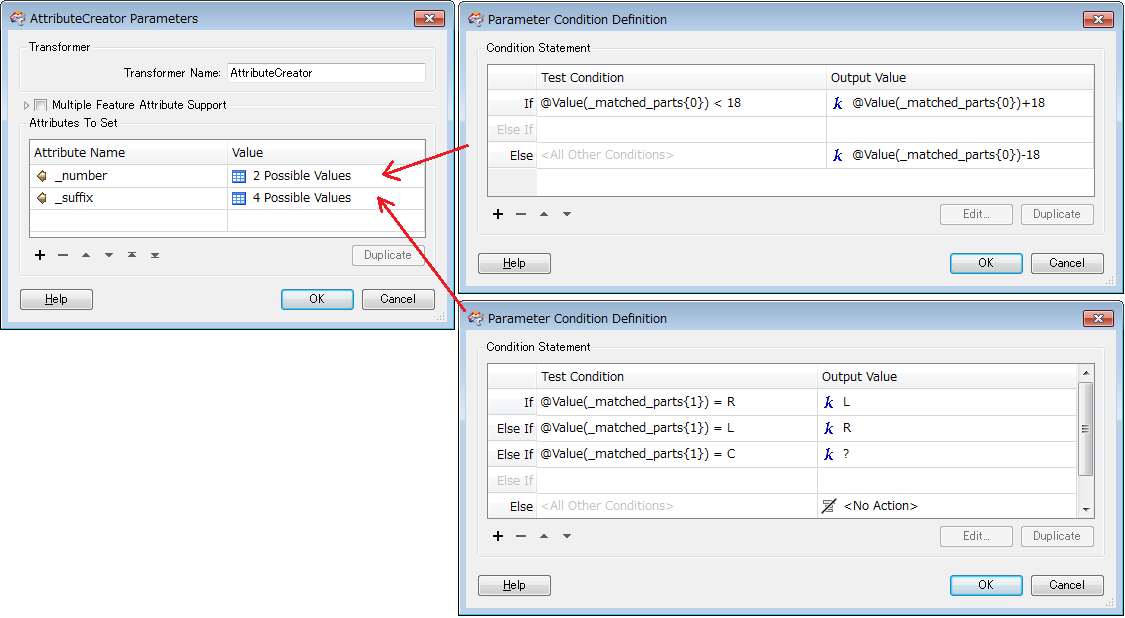
StringConcatenator
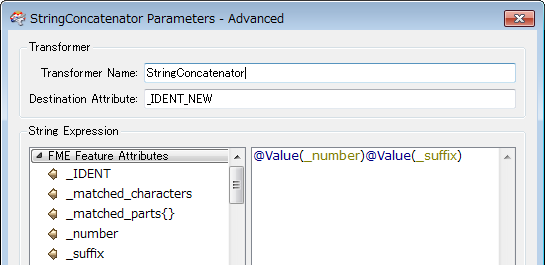
correction for the AttributeCreator setting.
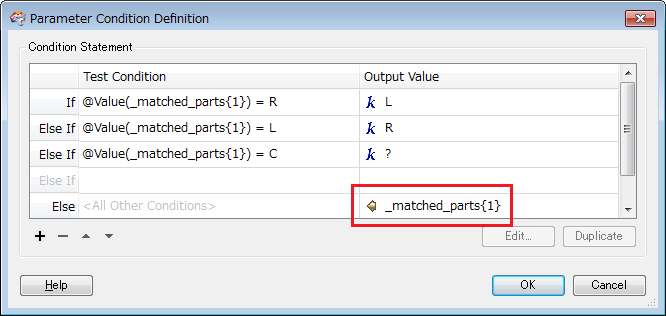
In FME 2014 or earlier, there are cases where digits starting with '0' will be interpreted as an octal number in a math expression. '08' and '09', for example, are invalid as octal number representation. Probably that's the reason for the error.
In FME 2015, digits always will be interpreted as a decimal number.
If you are using FME 2014, consider trimming leading '0's before calculation.
Sorry, correction again.
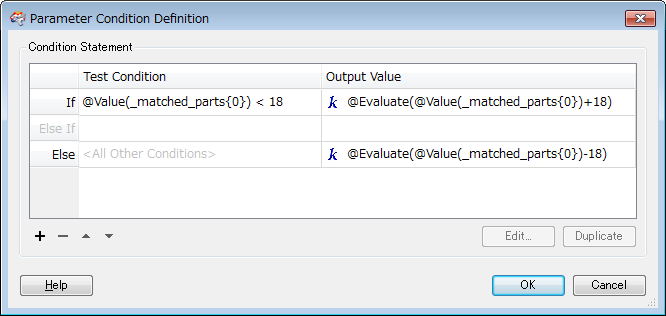
Thanks once again Takashi. That conditional value is quite convenient plus the regex. For my workflow I have to split them up to do the feature merge, but the process is overall much better to modify in the future I think.

Yes. The "Conditional Value" could reduce the number of transformers drastically in some cases, without using advanced function such as FME String Functions. I frequently use it.
It has been introduced in FME 2013 SP1. FYI.
FME 2013-SP1: Conditional Processing in FME (
http://blog.safe.com/2013/03/fmeevangelist113/)
I understand now, the IDENT format is integer plus a letter. Thats why u used a @INT().
I just surmised you were talking about a arbitrary string of arbitrary length.
I always prefer single transformer over a bunch of cumbersome transformers.
I only use conditional attribute creator for low count attributes (lik 2 or max 3) and then only sometimes, when im in a hurry.
I totaly disagree on using existing transformers (note the plural..;0) in favor of the power of tcl.
"Time figuring it out" is a matter of experience and savvy.
In that case the expression should be:
@Evaluate(@Evaluate(@FindString(@Value(tst),R))==-1?"@PadRight(@Evaluate(@Evaluate(@int(@TrimRight(@Value(tst),)R,L])))+18),3,L)":"@PadRight(@Evaluate(@Evaluate(@int(@TrimRight(@Value(tst),)R,L])))+18),3,R)")
resullts in
0 18R 36R
0 18L 36L
..i concede.. with that amount of @Evaluate() calls..6x .one might reconsider torturing oneself..
better do it in a tcl caller instead.. ;)
Im testing fme package..
and look wt# safe did!
fme_expression_warnings{0}.message (string): Failed to evaluate numeric expression '@real64(36L)'. Result is set to null.
The result is correct as is the expressionstring and it gets processed as ususal, but it insists to intepret it as a number...?!??@#?? That is so lame!









